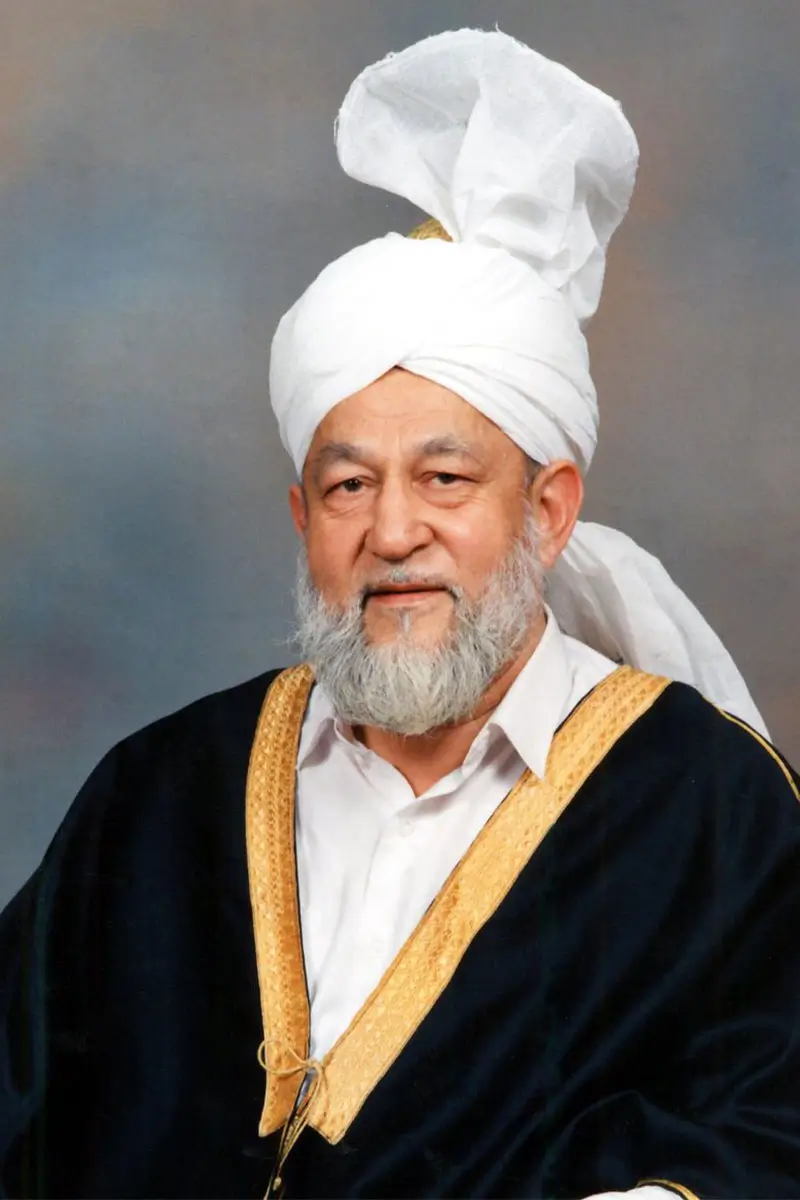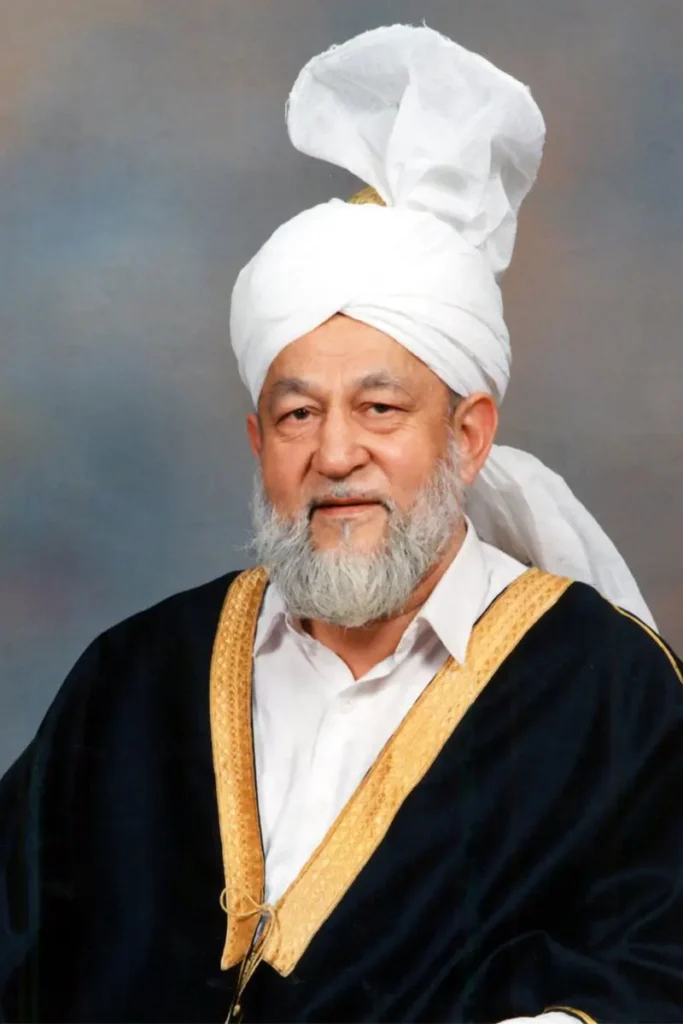Huzoor (rh): Let’s consider any man belonging to any religion. You open up the subject of the Prophet ﷺ’s truth in his claim to prophethood. That is the question, all right, please sit down. The truth of every prophet, not only that of the Prophet ﷺ, has the same fundamentals, there is no difference whatsoever. And the status of the Prophet has nothing to do with the proofs which are offered. They are two different things. The Holy Quran has described this issue in principles at various points, in various chapters. Number one, the Holy Quran describes the concept of prophethood in a way that it should be understood by the entire world, whatever the religion of this particular people be. It won’t make any difference. The claim in essence of a prophet is that a being, a supreme being, which is the creator and the lord and the master of the universe, has spoken to that particular person with a definite message and a definite commission. The message is to be delivered to the people to whom that person addresses and he has to perform his commission according to the direction of Allah. This is in essence what prophethood is understood in Islam and is described in the Holy Quran, which means that once the message is delivered, because it is delivered from a being high on, which is by right supreme and which has to be obeyed and followed by mankind because mankind and every other creation springs from his power of creation.
First of all this issue has to be discussed with people, those people who do not have this concept in view. First of all, generally when I have spoken on this issue, this has to be clarified first, that if there is a God, let’s start with that, from that premise. If there is a God, is that God really interested in the human affairs? Has he created us and then forgotten us or does he keep a live interest in human affairs? If so, what should be the evidence of his interest? How does he manifest that interest? There are two types of interests that God can show, one through his actions, through a constant watch over the phenomena of nature and the maintenance of laws of nature, that is observed quite silently. But does he, the second part is, does he really take such live interest as to speak to people and address them and wants to shape their lives according to certain values? It is there that the prophethood comes. So if the person believes in such a God, then the second issue would automatically be taken up.
And now I speak of only those persons who believe in God and this concept of God’s active interest. And Christians should be one of those. Now to them, the logical position should be that if God has spoken to such a person, then if such a person delivers the message and people deny him and ridicule him and treat him ill, then it is God’s responsibility to see to it that he ultimately becomes victorious. And despite all the mad opposition and the grave hostility, he should not be made to be frustrated by the people. He should not be made to be defeated by the people. This is the first responsibility of a powerful God who sends a messenger to a hostile world. So if this phenomena is observed in any claimant, then one should reasonably expect that that person is a rightful person. If he does not have any other support, that is any other worldly support, and only makes a claim which makes him the most hated person, the most persecuted, the most wanted person on earth in this regard, and he has no material support at his back, even his own followers, his own people desert him at such a crisis, then what should be the position of those who observe him to become successful, despite that opposition, continuously, to become successful at every hindrance which is created to stop his message? He goes on surmounting all difficulties and goes on spreading and flourishing. What should be the rational inference of those who observe this phenomena? Naturally, the natural inference should be that such a person must have been supported by a super-being and that claimant is only God who is supposed to have sent him according to his claim.
The second aspect of the same question is in the negative terms. Suppose a person claims to be a prophet of God in this sense, as I have said, a commissioned officer with a definite message, a message which has to be followed, and it is obligatory on every person who is addressed to follow that message. In such a position, if that person happens to be an imposter, what should be the attitude of that God who is taking active interest, this is the supposition, this is the premise from which we started, who is taking active interest in human affairs, this is why he sends his messengers, and who observes an imposter attributing things to him. Now, how would the mankind receive him, how should they treat him? Number one, because such a claimant claims to have received a revelation from a being which revelation cannot be intercepted by man in any way. No scientific achievement of man can create a device to intercept this message of Allah towards a human being. So human beings are totally incapable of finding the truth from that regard, from that point of view. They can’t testify to it in any way, directly speaking, I mean. There is no means to find out whether Allah did speak to such a person or not. So, in view of this background, it’s a very precarious position in which we find the mankind addressed by a claimant to prophethood. Mankind has no means to judge and verify whether Allah did speak to such a person, and they fear, on the other hand, that if such a person was righteous and true, they would receive the wrath of Allah. So what participation should Allah make towards this? What action should He make to establish the truth or to verify, and to establish the lack of truth, the contrary as well?
The Holy Qur’an also speaks on this issue and this possibility. The Holy Qur’an says that if a claimant has made a claim falsely, he’s an imposter, then Allah sees to it that he’s destroyed. And it’s not the job of mankind to do so. It is Allah’s first primary responsibility to destroy such a person. And if Allah does not destroy such a person, on the other hand, if the whole mankind wants to destroy such a person, and he is not destroyed, what should be the logical conclusion? No other conclusion can be drawn but that that person was sent by Allah, or at least such people should have to agree that whatever Allah there is, is completely insensitive to these things. He does not care whether people begin to attribute to him falsehoods or truths, or whether they cheat others in his name, and perpetrate frauds upon the people in his name. He is completely insensitive. So if that is the case, then there is no truth in any religion whatsoever. Then the whole question goes overboard and humanity should get rid of the whole concept of religion, because the God who is the source of all religions, he is disinterested, he is insensitive to insults towards him, himself, and he is insensitive to the fraud perpetrated upon the people in his name and so on and so forth. The whole concept of religion becomes insecure and untrustworthy and suspicious.
So Islam does not contribute towards that concept of God. What Islam says is that we believe in a powerful God, believe in a God who is responsible for all creation, believe in a God who is master of things and retains all powers, and remains actively interested in his creation. And with such a God, there is no other behaviour expected but the one which has been explained by the Holy Qur’an in these two regards. And now I refer to the verses of the Holy Qur’an where they have mentioned this. The first subject which I mentioned is discussed in the verse, لَقَتَبَ اللَّهُ لَأَغْلِبَنَّا أَنَا وَرُسُلِهِ Because we send the messengers, so it is primarily our responsibility to see to it that they ultimately become victorious. لَقَتَبَ اللَّهُ لَأَغْلِبَنَّا أَنَا وَرُسُلِهِ Allah has made it incumbent upon himself that he and his prophets would positively become successful and victorious over all opposition and others. And the second principle which I mentioned, that is in the negative terms, is described in the verses, تَقَوَّلَ عَلَيْنَا بَعْضُ الْأَقَابِيلِ لَأَخَذْنَا مِنْهُ بِالْيَمِينِ ثُمَّ لَقَتَانَ مِنْهُ الْوَتِينَ فَمَا مِنْكُمْ مِنْ أَحَدٍ أَنْهُ حَجَزِينَ That how can you conceive Allah to let anybody become prosperous who is attributing things to God unjustly and untruly. Even if Hazrat Muhammad, peace be upon him, whose truth is at the anvil, whose truth is to be verified. Allah says in the Holy Quran that this is a case in point. The Holy Prophet (sa) has made a claim that the whole of the Holy Quran has been revealed to him by Allah. And you who are addressed, you disbelieve him. You say he is an imposter and he himself has concocted the entire book. That is to say, Allah is so insensitive that a whole book is being concocted in his name and he does not care what happens to the mankind and whether people are deceived or not, it is not his concern.
So the Holy Quran tells us that this is not Allah, the creator. This may be an Allah of your mind, but true God does not behave like this. True God behaves extremely sensitively to these issues. If anybody misuses his name, he destroys them. This is why the Holy Quran says, not to mention the whole Quran, even if Muhammad peace be upon him had attributed a small saying towards Allah which Allah had not said to him. We would catch him at the sources of his power. ‘yad’ is the strength in fact. And ‘yameen’ is the symbol of the maximum strength one can have. The right hand’s power is the strongest. So yameen is the symbol of power, sources of power. So the Holy Quran says that Allah would certainly have caught him at the sources of his strength and power. And cut his jugular vein, his life artery. Then none among you, if Allah had so decided, would be able to stand in the way of punishment which Allah has decided for him, which Allah has ordained for him. Nobody would be able to save him from the wrath of Allah in that case. So this is the argument of the Holy Quran, which is accepted by us and which we present to others, not because it is said in the Holy Quran, because there is no other logical conclusion one can draw. It has to be like this. If not, then the whole world of religion would be untrustworthy.
For instance, if I apply it to the situation in the world, then you will understand it better and then you can present it in a better shape to whomsoever you want to present this argument with. In the worldly affairs, in an established government, where the law is operative, when the might of a government is established, if somebody poses to be a representative of the government and by so doing wants to deceive the people, the subjects of that government, and those particular people who are being made subject of this deception have no means to find out whether the person really represents the government or not, what should be the reaction of the people? For instance, somebody walks in a uniform here, uniform of any particular department of the government, and says, I have been sent by my department to deliver this message. Say, for instance, he says that that particular department has the power to impose five pounds each fine upon all of us, and he comes and declares that, look at my costume, I represent that uniform, I represent that department, and I have come to impose that fine on each one of you sitting here. You have violated such and such law and I have imposed this, so hand over the fine to me. Now, you don’t know, what would you do? If you can have access to any higher authority in that government, the immediate reaction would be for you to report the matter to that and find out and check. And if the government already knows that this is happening, then it is the first priority, first responsibility of that government to immediately interfere and see to it that the fraud is not perpetrated, is not made to operate successfully. Is that not logical? If it is not logical, then what logic means, I don’t know.
So, in this case, when a prophet, somebody makes claim to a prophethood, he is being directly observed by God, whose kingdom is held in his right hand, whose laws are operative, and he has strength enough to see to it that his laws are operative and not violated. Such a God is observant and he knows what is happening. And he also knows that everybody does not have a means to ask directly of Allah, what is the matter and whether we should regard him as an honest, a true person or a wrong person. So, what should be the reaction of such a God? If he then permits this fraud to be perpetrated upon the people and does not take interest, then if people go wrong, they cannot be punished. It is Allah’s responsibility. But if people treat such a person with cruelty and persecute him, and he happens to be from God, then such a people would definitely be punished. So, the safest attitude for the people in such a case would be to at least be neutral and say, well, if such a claimant from Allah, if he is true, we don’t know, we have no means. It is for Allah to establish this. And they should wait.
If Allah supports him, despite all hostility and opposition, and he becomes or he is permitted to become successful, then such a man cannot be an imposter. If, on the other hand, such a claimant is supported by the people of the earth, by certain clans and tribes or certain forces, and still he is destroyed and annihilated, then such a person cannot be a true person, a true prophet. So, this is a simple criteria to which you can apply the truth of Hazrat Rasool-e-Karim (sa) as a messenger and truth of any other claimant, not only Hazrat Rasool-e-Karim (sa) himself. And there are other things also mentioned in the Holy Qur’an, but there is such a vast subject, I think this should suffice for the time being.








